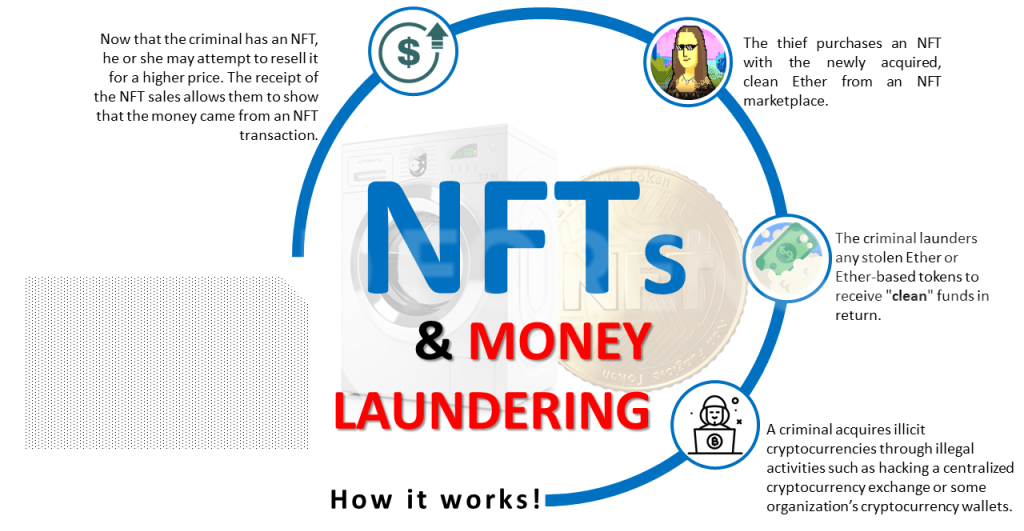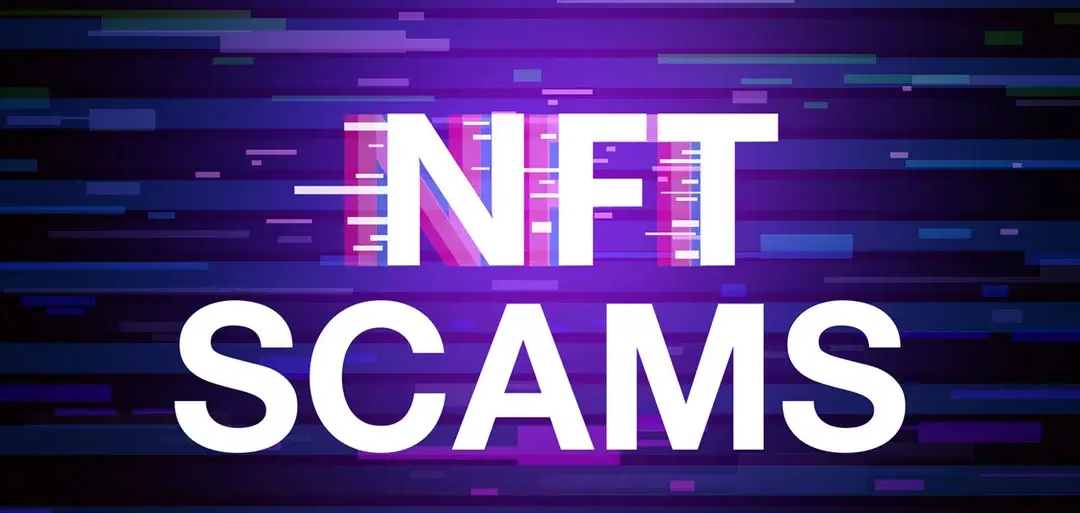NFT Fraud And Scams Prevention - Safeguarding Your Digital Art
Protect your NFT investments with expert guidance baout NFT fraud and scams prevention. Learn to spot and prevent frauds and scams in the digital art market.
Author:James PierceReviewer:Camilo WoodFeb 08, 2024678 Shares56.4K Views

As the popularity of Non-Fungible Tokens (NFTs) continues to soar, so does the risk of fraud and scams within the digital art and collectibles market. NFTs, representing ownership of unique digital assets on blockchain, have become a lucrative target for malicious actors seeking to exploit unsuspecting buyers. So, let's learn about NFT fraud and scams preventionin detail.
This guide provides a detailed overview of common NFT fraud and scams and offers essential preventive measures to safeguard your valuable investments.
Understanding NFT Fraud
NFT fraud encompasses various deceptive practices designed to exploit buyers and sellers in the NFT market. These fraudulent activities can range from fake token sales and unauthorized reproductions of digital assets to phishing attempts and misleading metadata associated with NFTs.
Spotting Fake NFT Sales
Fraudsters may create counterfeit NFT listings, claiming to represent well-known artists or projects. To prevent falling victim to fake NFT sales, buyers should thoroughly research the legitimacy of the artist, verify the smart contract details, and cross-check the information with reputable sources.
Unauthorized Reproductions And Plagiarism
Scammers often attempt to sell unauthorized reproductions or plagiarized versions of popular NFTs. Buyers should carefully examine the authenticity of the digital asset, ensuring it is an original creation by the legitimate artist. Artist verification, reverse image searches, and blockchain transaction history reviews can help in this process.
Phishing Attempts In NFT Space
Phishing remains a prevalent threat in the NFT space, with scammers using fake websites, emails, or messages to trick users into revealing their private keys or sensitive information. To prevent phishing attempts, always access NFT platforms directly through secure channels, be cautious of unsolicited communications, and never share private keys.
Misleading Metadata And Token Information
Fraudulent NFT listings may have misleading metadata, providing inaccurate details about the digital asset. Buyers should carefully scrutinize the metadata to ensure it aligns with the actual content of the NFT. Inconsistencies or incomplete information could be red flags indicating potential fraud.
Now, have a look at NFT fraud and scams prevention strategies:
Use Reputable NFT Marketplaces
Choosing well-established and reputable NFT marketplaces, such as OpenSea, Rarible, or Mintable, significantly reduces the risk of encountering fraudulent listings. Stick to platforms with a proven track record of secure transactions and positive user reviews.
Verify Smart Contract Details
Before making any NFT purchase, verify the details of the associated smart contract. Ensure that the contract address matches the information provided by the artist or project. This verification step helps confirm the authenticity of the NFT and reduces the risk of falling victim to scams.
Do Your Research
Before approving any transaction, be sure you have read the details. Is the online store you're using reliable and well-established? Can you see the transaction history of the seller or the buyer? Examine evaluations and the degree of interaction from creators to find out whether there have been any prior grievances over their transactions. Verify the legitimacy of the developers behind a project before investing in it.
Never Open Files From Senders You Are Not Familiar With
Viruses specifically designed to target cryptocurrency wallets have been generated by hackers. Links in unwanted emails should not be clicked since they can take you to phony exchange websites. Never open attachments or links from unidentified sources.
Beware Of Freebies
Giveaways or "free drops" are widespread in the NFT realm, but they can also pose security problems. Because each NFT is linked to a contract that specifies what may be done with it, hackers can attach authorizations to do things like sell your holdings, access your wallet, and more. Never take an NFT from a person you don't know and believe in.
Never Share To Your Cryptocurrency Wallet's Private Key Or Seed Phrase
Safeguard your seed phrase and private key. Anyone with access to these data can enter your wallet and remove any NFTs or bitcoin without leaving a trace. For your other NFT accounts as well as your cryptocurrency wallet, use strong passwords. Use two-factor authentication for all of your NFT accounts whenever possible.
Utilize Reputable Secondary Marketplaces
Reputable secondary marketplaces like OpenSea and Rarible offer additional layers of security. Transactions conducted on these platforms are often more secure, reducing the risk of encountering fraudulent or misleading NFT listings.
Enable Two-Factor Authentication (2FA)
Securing your digital wallet with two-factor authentication adds an extra layer of protection. By enabling 2FA, even if your password is compromised, unauthorized access to your wallet and NFT holdings becomes significantly more challenging for potential scammers.
Be Skeptical Of Unsolicited Communications
Phishing attempts often involve unsolicited emails, messages, or links claiming to be from NFT platforms or artists. Exercise caution and never click on links or provide sensitive information in response to unexpected communications. Always verify the legitimacy of the source through official channels.
Verify NFT Listings Across Platforms
Cross-verify NFT listings across multiple reputable platforms. Legitimate NFTs should have consistent details, including artist information, metadata, and associated smart contract details. Inconsistencies between listings on different platforms may indicate potential fraud.
Educate Yourself About NFT Scams
Staying informed about common NFT scams and fraud tactics is essential. Regularly update yourself on the latest fraud trends, phishing techniques, and common red flags associated with fraudulent NFT listings. Awareness is a powerful preventive measure.
Participate In Verified Drops And Auctions
Verified drops and auctions on reputable platforms often feature well-known artists and projects. Participating in these events increases the likelihood of acquiring authentic and valuable NFTs. Verified events are typically more secure and less susceptible to fraud.
Use Reputable Wallets
Choose reputable digital wallets that support NFTs, such as MetaMask or Coinbase Wallet. Avoid using unknown or untrusted wallets, as they may expose you to potential security risks. Securely back up your wallet with a strong password and, if available, enable two-factor authentication.
Preventing Rug Pull Scams
Rug pull scams, prevalent in DeFi and NFT projects, involve creators abruptly abandoning projects, leaving investors with worthless tokens and substantial losses. Scammers attract investors with promises of high returns and rarity, encouraging liquidity and token purchases.
Once a significant investment is secured, scammers vanish, causing financial harm. To protect yourself, research projects and teams, use reputable platforms, audit smart contract codes, diversify investments, stay informed, and engage with project communities.
Be cautious of warning signs, contradictory information, and unresponsive teams. Thoroughly examine official websites for legitimacy, and a well-defined roadmap adds an extra layer of security to your investments. Stay vigilant in the dynamic crypto and NFT space to avoid falling victim to rug pull scams.
Preventing Pumps And Dumps In NFTs Projects
In the context of NFT (Non-Fungible Token) projects, "pump and dump" methods refer to dishonest practices whereby individuals or groups boost the price or popularity of NFTs artificially in order to sell them for a profit, leaving other investors with tokens that have no value. These schemes can undermine the integrity of the NFT market and are usually unlawful.
It's crucial to carry out careful study, confirm the veracity of information, and use prudence while investing in NFTs to safeguard yourself against becoming a victim of pump-and-dump scams in NFT projects.
Projects that claim rapid, implausible advantages should be avoided, and before engaging in any NFT effort, think about consulting with reliable sources. Furthermore, be mindful of the regulatory landscape in your area, since participation in pump-and-dump schemes may result in legal ramifications for those concerned.
NFT Fraud And Scams Prevention - FAQs
What Is The Legitimacy Of NFT?
You can investigate the owner's social media accounts, examine the NFT's information, validate it with a blockchain explorer such as Etherscan.io, look for its digital certificate, and watch out for any red flags in order to confirm the validity of an NFT.
How Can I Prevent NFT Fraud And Scams When Buying Digital Assets?
Prevent NFT fraud by using reputable marketplaces, verifying smart contract details, and researching artists thoroughly.
What Are Common Red Flags For Fake NFT Sales And Unauthorized Reproductions?
Red flags include inconsistent metadata, suspicious smart contract details, and lack of artist verification.
How Can Two-factor Authentication Enhance NFT Security For Buyers?
Enabling two-factor authentication adds an extra layer of protection to digital wallets, making unauthorized access more challenging for scammers.
How Can Buyers Prevent Misleading Metadata And Inaccurate Token Information In NFT Purchases?
Buyers should scrutinize metadata for accuracy, ensuring it aligns with the actual content of the NFT, and be cautious of incomplete or inconsistent information.
Are There Specific Preventive Measures Against Phishing Attempts In The NFT Space?
Prevent phishing by avoiding unsolicited communications, accessing NFT platforms directly through secure channels, and never sharing private keys or sensitive information.
Conclusion
As the NFT market continues to evolve, it is crucial for buyers and sellers to remain vigilant against fraud and scams.
By understanding the common tactics employed by scammers, utilizing NFT fraud and scams prevention strategies, and staying informed about the latest developments in the NFT space, investors can enjoy a secure and rewarding experience in the world of digital art and collectibles.
Always prioritize due diligence, verify information thoroughly, and leverage reputable platforms to minimize the risk of falling victim to NFT fraud and scams.
Jump to
Understanding NFT Fraud
Spotting Fake NFT Sales
Unauthorized Reproductions And Plagiarism
Phishing Attempts In NFT Space
Misleading Metadata And Token Information
Use Reputable NFT Marketplaces
Verify Smart Contract Details
Do Your Research
Never Open Files From Senders You Are Not Familiar With
Beware Of Freebies
Never Share To Your Cryptocurrency Wallet's Private Key Or Seed Phrase
Utilize Reputable Secondary Marketplaces
Enable Two-Factor Authentication (2FA)
Be Skeptical Of Unsolicited Communications
Verify NFT Listings Across Platforms
Educate Yourself About NFT Scams
Participate In Verified Drops And Auctions
Use Reputable Wallets
Preventing Rug Pull Scams
Preventing Pumps And Dumps In NFTs Projects
NFT Fraud And Scams Prevention - FAQs
Conclusion

James Pierce
Author

Camilo Wood
Reviewer
Latest Articles
Popular Articles

